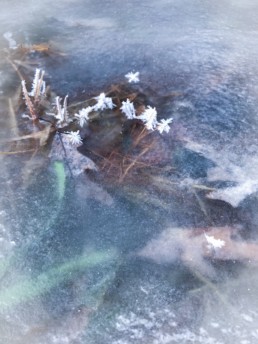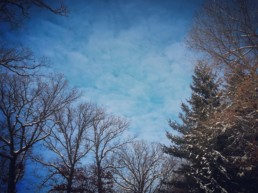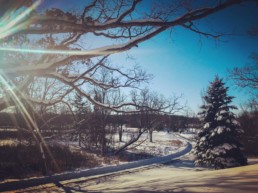This winter morning, newly dawning outside my window, is brittle and still. None of the softer words for the season apply, as the “coldest temperatures in a generation” clench and fracture the air. The blanket of snow is now an icy pall; gnarled trees etched against the pewter sky yield stiffly to the piercing wind. Honey and amber paint the eastern sky but surrender no sweetness or warmth.

"All shall be well, and all shall be well, and all manner of things shall be well."
~ Julian of Norwich
We denizens of the northern latitudes are well versed in wind chills and woolen layers, sturdy shovels and frozen fingers. Arriving at the end of January is less about “snowflakes that stay on my nose and eyelashes” and more about the strata of salt that adheres to our cars. Even though our mid-winter attitudes are as crusty as our vehicles, we are still stunned by a day like today, with the power to sting fragile flesh and quiet beating hearts. We know what is required; to shelter in place if we can, or bundle our vulnerable bodies if we cannot. But we are unpracticed in slowing down, and the machinery of the modern world is reluctant to let us do so. Why is it so difficult, as individuals and as a society, to still ourselves, even for one frozen day?
Why is it so difficult, as individuals and as a society, to still ourselves, even for one frozen day?

Some of us are required to carry on with the work that keeps a community safe. Wailing sirens herald help and protection; hospital hallways are warm and staffed; farmers will tend to the herd; workers will fix broken pipes and faulty furnaces. Some will provide safety and warmth for their own beloved families; some will feed and shelter strangers. Others dutifully attend jobs that fuel the country’s economic engines, perhaps because they have been asked or required to do so, perhaps because they will miss a vital day of pay if they do not. Or their employers may acknowledge the risks posed by the exceptional weather, but force a “vacation” day for circumstances beyond anyone’s control. How many of those decisions are driven by incessant consumer demand? Should capitalism cede to the weather? Must cash flows and work flows remain unfrozen and unimpeded, even when it risks workers’ safety or peace of mind? At what point do we take ourselves, our structures, our habits too seriously? Why is it so hard for us as a society to simply be still?
Yesterday I told a colleague that we should hibernate like bears through the winter. She laughed and said that we would all be as big as bears at the end of the season. But bears emerge from their dens lean and hungry; the seasons tell them when it is time to store up and slow down, and when to awaken and begin again. So many of us have forgotten the rhythms of cycles and seasons, the ability to prepare and then live with what we have, to stop and still ourselves for even one day, let alone an entire season. We are driven by – what? Fear? Boredom? Restlessness? Greed?

"In seed time learn, in harvest teach, in winter enjoy."
~ William Blake
I am grateful for an old and drafty house that will keep my family out of danger today. I value work that allows me to pause and attend to it from home; for healthy children that are burrowed under blankets, asleep; for a husband who made it safely to work outside of this space. I honor him, and all those whose work requires physical presence today, and discomfort, and risk. I wonder if a day like today might help us to think more deeply about that which is truly required, to let go of the things that are excess, and to find ourselves and each other more fully?
What lessons might we learn from the frozen stillness?